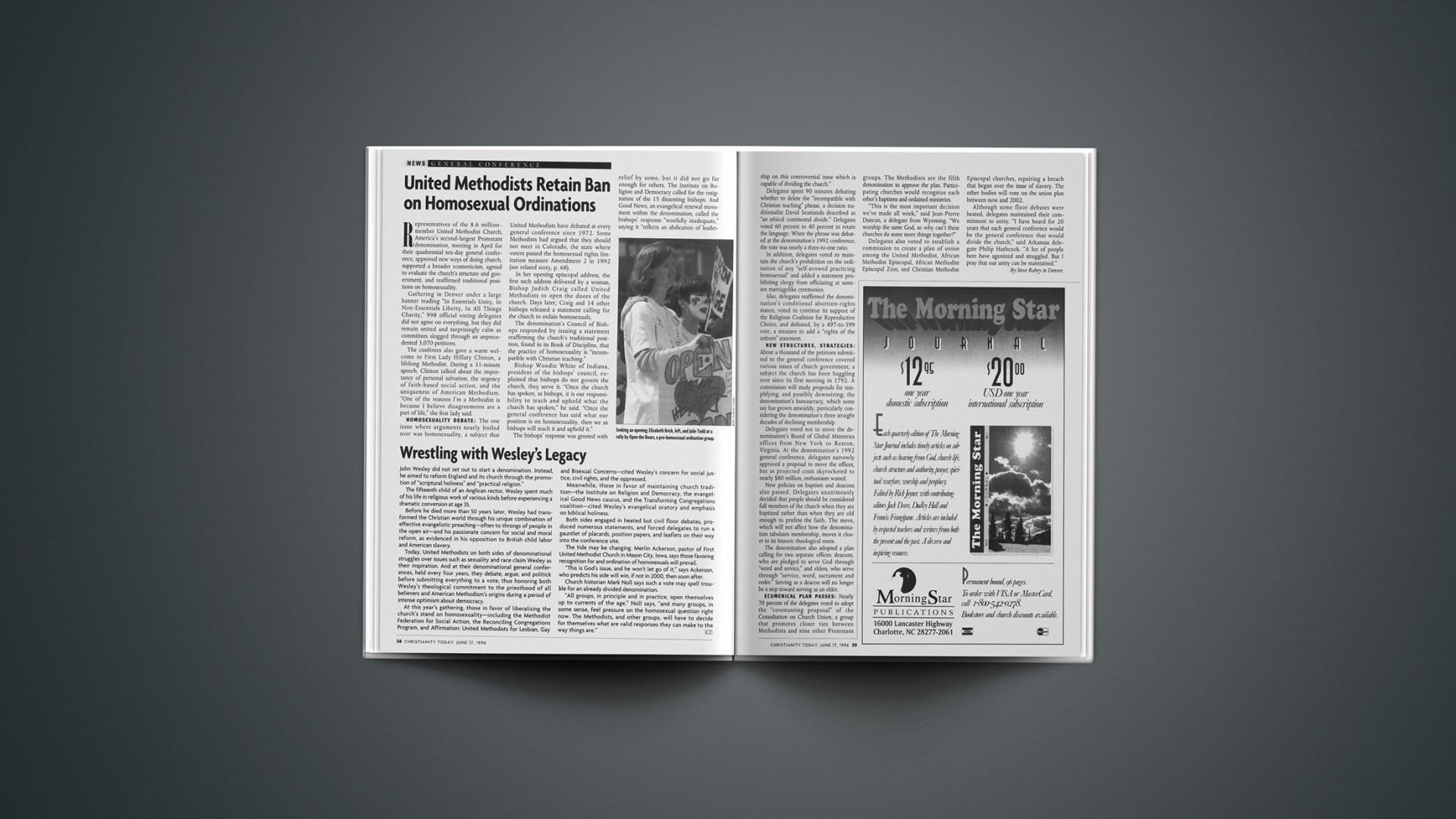Representatives of the 8.6 million- member United Methodist Church, America’s second-largest Protestant denomination, meeting in April for their quadrennial ten-day general conference, approved new ways of doing church, supported a broader ecumenicism, agreed to evaluate the church’s structure and government, and reaffirmed traditional positions on homosexuality.
Gathering in Denver under a large banner reading “In Essentials Unity, In Non-Essentials Liberty, In All Things Charity,” 998 official voting delegates did not agree on everything, but they did remain united and surprisingly calm as committees slogged through an unprecedented 3,070 petitions.
The conferees also gave a warm welcome to First Lady Hillary Clinton, a lifelong Methodist. During a 31-minute speech, Clinton talked about the importance of personal salvation, the urgency of faith-based social action, and the uniqueness of American Methodism. “One of the reasons I’m a Methodist is because I believe disagreements are a part of life,” the first lady said.
HOMOSEXUALITY DEBATE: The one issue where arguments nearly boiled over was homosexuality, a subject that United Methodists have debated at every general conference since 1972. Some Methodists had argued that they should not meet in Colorado, the state where voters passed the homosexual rights limitation measure Amendment 2 in 1992 (see related story in this issue).
In her opening episcopal address, the first such address delivered by a woman, Bishop Judith Craig called United Methodists to open the doors of the church. Days later, Craig and 14 other bishops released a statement calling for the church to ordain homosexuals.
The denomination’s Council of Bishops responded by issuing a statement reaffirming the church’s traditional position, found in its “Book of Discipline,” that the practice of homosexuality is “incompatible with Christian teaching.”
Bishop Woodie White of Indiana, president of the bishops’ council, explained that bishops do not govern the church, they serve it. “Once the church has spoken, as bishops, it is our responsibility to teach and uphold what the church has spoken,” he said. “Once the general conference has said what our position is on homosexuality, then we as bishops will teach it and uphold it.”
The bishops’ response was greeted with relief by some, but it did not go far enough for others. The Institute on Religion and Democracy called for the resignation of the 15 dissenting bishops. And Good News, an evangelical renewal movement within the denomination, called the bishops’ response “woefully inadequate,” saying it “reflects an abdication of leadership on this controversial issue which is capable of dividing the church.”
Delegates spent 90 minutes debating whether to delete the “incompatible with Christian teaching” phrase, a decision traditionalist David Seamands described as “an ethical continental divide.” Delegates voted 60 percent to 40 percent to retain the language. When the phrase was debated at the denomination’s 1992 conference, the vote was nearly a three-to-one ratio.
In addition, delegates voted to maintain the church’s prohibition on the ordination of any “self-avowed practicing homosexual” and added a statement prohibiting clergy from officiating at same-sex marriagelike ceremonies.
Also, delegates reaffirmed the denomination’s conditional abortion-rights stance, voted to continue its support of the Religious Coalition for Reproductive Choice, and defeated, by a 497-to-399 vote, a measure to add a “rights of the unborn” statement.
NEW STRUCTURES, STRATEGIES: About a thousand of the petitions submitted to the general conference covered various issues of church government, a subject the church has been haggling over since its first meeting in 1792. A commission will study proposals for simplifying, and possibly downsizing, the denomination’s bureaucracy, which some say has grown unwieldy, particularly considering the denomination’s three straight decades of declining membership.
Delegates voted not to move the denomination’s Board of Global Ministries offices from New York to Reston, Virginia. At the denomination’s 1992 general conference, delegates narrowly approved a proposal to move the offices, but as projected costs skyrocketed to nearly $80 million, enthusiasm waned.
New policies on baptism and deacons also passed. Delegates unanimously decided that people should be considered full members of the church when they are baptized rather than when they are old enough to profess the faith. The move, which will not affect how the denomination tabulates membership, moves it closer to its historic theological roots.
The denomination also adopted a plan calling for two separate offices: deacons, who are pledged to serve God through “word and service,” and elders, who serve through “service, word, sacrament and order.” Serving as a deacon will no longer be a step toward serving as an elder.
ECUMENICAL PLAN PASSES: Nearly 70 percent of the delegates voted to adopt the “covenanting proposal” of the Consultation on Church Union, a group that promotes closer ties between Methodists and nine other Protestant groups. The Methodists are the fifth denomination to approve the plan. Participating churches would recognize each other’s baptisms and ordained ministries.
“This is the most important decision we’ve made all week,” said Jean-Pierre Duncan, a delegate from Wyoming. “We worship the same God, so why can’t these churches do some more things together?”
Delegates also voted to establish a commission to create a plan of union among the United Methodist, African Methodist Episcopal, African Methodist Episcopal Zion, and Christian Methodist Episcopal churches, repairing a breach that began over the issue of slavery. The other bodies will vote on the union plan between now and 2002.
Although some floor debates were heated, delegates maintained their commitment to unity. “I have heard for 20 years that each general conference would be the general conference that would divide the church,” said Arkansas delegate Philip Hathcock. “A lot of people here have agonized and struggled. But I pray that our unity can be maintained.”
Copyright © 1996 Christianity Today. Click for reprint information.










